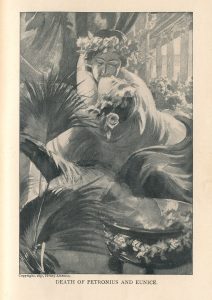Petronius Arbiter was a Roman who lived during the reign of Nero, and—according to most historians—the author of The Satyricon. We don’t know much about Petronius’life, but according to Tacitus,“His days he passed in sleep, and his nights in the business and pleasures of life. . . Indolence had raised him to fame, as energy does others. . .” and he was seen as an “expert in luxury.” Despite his free- wheeling lifestyle, Petronius became governor of Bithynia, and later Consul. He was exemplary at his job—hardworking and intelligent. Eventually, Nero chose him to act as his “arbiter of elegance”—a sort of official trendsetter. Nero “thought nothing charming or elegant in luxury unless Petronius had expressed to him his approval of it.” Ofonius Tigellinus, a Praetorian Guard, became jealous of Petronius’ influence. He accused Petronius of having been part of a conspiracy against Nero.
Petronius didn’t want to wait and see if Nero was going to have him executed or not, so he decided to commit suicide. He cut his wrists and bound them so he would bleed out slowly, and died as he lived: eating, drinking, and talking trash. “He wrote a detailed report of the emperor’s shameful excesses, with the names of his gigolos, his women and their innovations in indecency, and sent the account under seal to Nero.”
 Today, Petronius is remembered as the author of The Satyricon, a humorous work of fiction that explores vulgarity and ridiculousness. It follows three miscreants as they feast, fight, and debauch their way through the Mediterranean world.
Today, Petronius is remembered as the author of The Satyricon, a humorous work of fiction that explores vulgarity and ridiculousness. It follows three miscreants as they feast, fight, and debauch their way through the Mediterranean world.
The Satyricon mocks the extravagant debauchery of Neronian society. However, it is difficult to determine the meaning of The Satyricon partly because it survives in fragments, which makes it difficult to understand, and partly because it is so utterly bizarre, so no one can make heads or tails of it. It has been classified as—among other things— a mock epic, an early novel, and a Menippean satire. But the first two definitions seem too narrow, and “satire” implies a preoccupation with morality that Petronius . . . lacks.
Despite The Satyricon’s raunchy reputation, it does have scholarly value. Unlike most Latin texts, which are poetry or oratory, The Satyricon has sections of informal prose—giving historians and classicists an insight into how ordinary Romans spoke.
Though it has its confusing and salacious reputation, The Satyricon has stood the test of time—it’s influenced many great authors. For example, Oscar Wilde mentions Petronius in A Picture of Dorian Gray, stating that Dorian wanted to be the London equivalent of what Petronius was to Rome. The epigraph of T. S. Elliot’s The Wasteland is a quote from The Satyricon. Most famously, F. Scott Fitzgerald based Gatsby, in part, off of the character Trimalchio—a pretentious nouve riche freedman—and had originally intended to name the book Trimalchio in West Egg.
The Satyricon, whatever else it might be, is a criticism of the excess, depravity, and shameless cupidity that Neronian Rome tried to pass off as sophistication. When other authors reference Petronius, they speak of him to promote restrained elegance and condemn unrefined extravagance. Perhaps, more than anything else, The Satyricon is a testament to three of humanity’s most enduring qualities: pretension, hypocrisy, and bad taste.
Bibliography:
Arbiter, Petronius, Robert Bracht. Branham, and Daniel Kinney. Satyrica. Berkeley: U of California, 1996. Print. Petronius, Titus, Lucius Annaeus. Seneca, and J. P. Sulli- van. The Satyricon and the Apocolocyntosis. Harmondsworth: Penguin, 1986. Print. Tacitus. Annales, Book 16, AD 14-68.